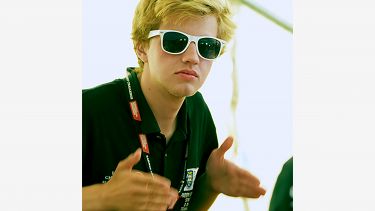I learned the importance of working throughout a semester

What drew you to apply and accept a place on the Foundation Year (FY)?
I originally wanted to do Geography at university with an interest in the environment and weather. Afterwards I wanted to go to work in either sustainability or reducing the impact of bad weather on people's lives.
I then became worried that a degree in Geography would not prepare me to design technical solutions to these problems, so I decided to apply for Mechanical Engineering with a Foundation Year.
The teaching facilities at Sheffield were better than other universities and the Students’ Union was fantastic, so when I received an offer I accepted straight away.
What was your educational background before and what were the main concerns you had before embarking on the course?
I did A-levels in Chemistry, Biology and Geography and an AS in Maths.
I was worried that studying Maths and Physics again would be too hard for me. I was also concerned about producing reports since I'd gotten out of practice with writing.
How did FY help to prepare you for Year 1 study and beyond?
In the Foundation Year we had weekly labs and after each one we wrote a section of a lab report. This was then marked and we were given thorough written feedback. This prepared me so well for first-year whereas other students had to learn from scratch.
The individual report and group projects were also a great opportunity to learn to write and present and receive lots of feedback. There was a lot of work (more than I had in my first year), so I learnt to manage a workload effectively.
What were the big learning points for you during your FY?
The biggest thing I learned was the importance of working throughout a semester. If you make sure you keep up with lecture material and coursework, it's much easier in the end. You can get support and improve as you go instead of trying to do it all at once.
The best way to overcome challenges is to tackle them early and ask for help.
Patrick Appelqvist
MEng Mechanical Engineering with a Year in Industry
What do you enjoy most about your current degree programme?
I really enjoy the dynamics and mechanics of solids topics in Mechanical Engineering. It's very satisfying applying theory to problems and getting answers that are pretty accurate.
Studying Mechanical Engineering also gave me the ability to join the Railway Challenge at Sheffield team and apply my learning to a design problem.
What are your favourite things about studying in Sheffield?
The best thing about studying in Sheffield is there's so much to do! There are loads of societies and student-led activities you can take part in.
For me, Railway Challenge is a really fun way to apply my degree to a problem in a relaxed environment. I also joined the canoe club to take up a new sport and it's brilliant.
There are green spaces and the city is generally really pleasant. It's also in a rain shadow, so the weather is relatively nice.
What has the wider University offered you in terms of support and student community?
The Students’ Union is very nice, so is great for the student community. There are cheap cinema tickets, nice places to sit and chat and lots of societies to meet people.
The student support services are really efficient and personal and you can tell they really care about helping you. Personally, joining societies introduced me to most of my new friends and I have the Students’ Union and the university to thank for that.
How have you overcome challenges so far and what would be your advice to a prospective Foundation Year student?
The best way to overcome challenges is to tackle them early and ask for help. Whenever I'm struggling with work, I always go to a lecturer and they're more than happy to clarify anything for you.
Having a good work-life balance is a good idea, too. I do three extracurricular activities and these all help me unwind after a tricky assignment, so I'm more focused when I return to work on it.
What are your career aspirations after your degree?
After my degree I really don't know what I want to do. I've thought a lot about going into the rail industry but I'd also like to go into nuclear fusion.
I know that I'd like to go into engineering design but am not too sure where yet. But mechanical engineering is very flexible, so there are a lot of doors still open.

Visit us
Discover what sets Sheffield apart at our undergraduate open days on Saturday 21 June and Saturday 5 July 2025.

